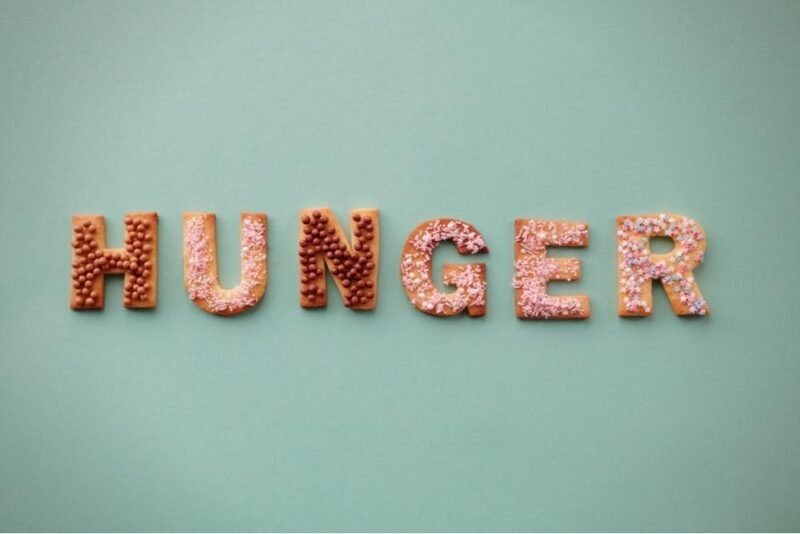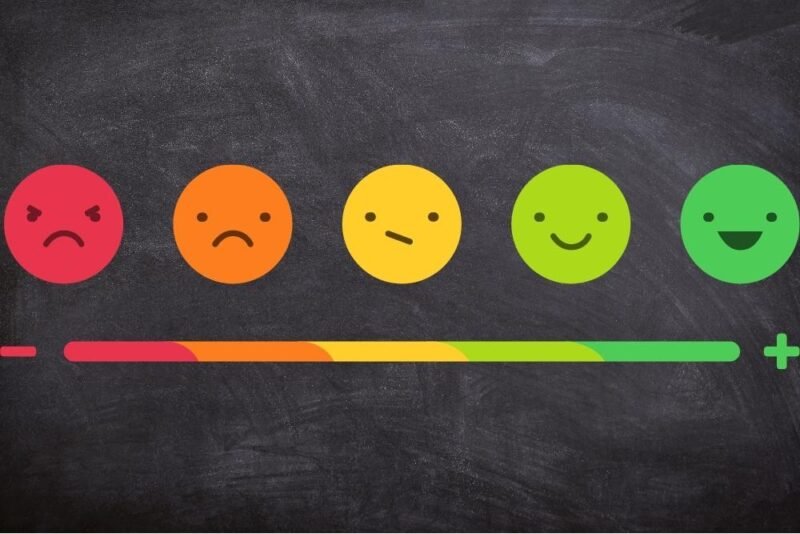
If you’ve explored intuitive or mindful eating, you’ve probably crossed paths with hunger scales. Maybe you tried using such a scale, and found it tedious, or even hard. Maybe you wondered, “Is this even helpful?” Let me ask you a few questions:
- Do you have a tendency to graze all day rather than eat real meals, perhaps mindlessly?
- Does it seem like you go from perfectly fine to hangry — hungry and angry — in the blink of an eye?
- Do you get wrapped up in a project, a book or several episodes of your favorite streaming show, only to emerge on the other side ready to eat whatever isn’t nailed down, maybe feeling a little out-of-control in the process?
If you answered “yes” to any of these, you might indeed benefit from using a hunger scale.

All hunger scales are not created equal
The typical hunger scale has numeric values, usually combining hunger and fullness ratings in the same scale. One example is a 0-10 scale, with 0 being intensely, painfully hungry, while 3 would be gently hungry and ready to eat, but without urgency, and 5 would be neutral, neither hungry nor full. (Conversely, 7 would be comfortably full while 10 would be painfully full.)
This type of rating system is similar to the pain rating systems used in hospitals, and because hunger, like pain, is a subjective feeling, there’s no right or wrong rating.
I’ve previously interviewed Evelyn Tribole, MS, RDN, co-author of the book “Intuitive Eating: A Revolutionary Anti-Diet Approach [1]” (and co-creator of the Intuitive Eating model) about this very issue and she said that while some people like to use a numeric hunger rating scale, she often recommends focusing more on the quality of the hunger, rather than trying to pin down the amount. For example, you could ask yourself if your hunger is pleasant, unpleasant or neutral.
Evelyn says categorizing hunger this way is more in tune with how our brains work, although it’s not always as simple as it appears. While most people know what unpleasant hunger feels like, she told me, “When I ask people about pleasant hunger, it’s crickets.”
In person and in “Intuitive Eating,” Evelyn encourages beginning eating when feeling pleasant hunger — about a 3, on the numeric scale — but that’s only a guideline, not a hard-and-fast rule. “This is not about precision,” she says. “Ultimately it’s about what works best for you.”

Why rate your hunger at all?
Hunger scales — whether numeric or qualitative — are valuable tools for tuning into your hunger signals and learning about yourself. If you wonder why your hunger sometimes feels so ferocious and primal, it may be because you’ve been ignoring your hunger.
Tuning into how hungry you’re becoming can help you avoid reaching the point where you want to eat everything in sight. If you tend to become “hangry” when you get too hungry, this can also help prevent wanting rip the nearest person’s head off. (I can easily fall into that camp myself.)
If you find that you tend to mindlessly graze through the day, checking in with your hunger is a way to hit the “pause” button. If you are truly hungry, you can assess if you need to stop for a real meal, eaten mindfully. If you realize you’re not actually hungry, even though you’re reaching for food, you can ask yourself what you’re really seeking. Are you bored, procrastinating, sad, stressed, lonely? Food might not be the best way to meet your exact needs.
Checking in with your hunger can also help you notice how your eating is different when you begin a meal when you are still comfortably, pleasantly hungry as opposed to when you wait until you are already experiencing uncomfortable or primal hunger.
In a broader sense, becoming more aware of your hunger can also lead to becoming more aware of your other bodily states and sensations — known as interoceptive awareness—which can provide additional information about what you’re feeling or what your body needs.

Who (maybe) shouldn’t use a hunger scale?
One case where a using a hunger scale may not be the best idea is if you’ve turned it into a diet tool. (“I can’t eat unless my hunger is a 2 or 3.”) Not only does this rigidity not allow for eating for pleasure and connection — such as a slice of cake at a birthday party — but it’s not practical.
What happens if you’re about to head into back-to-back meetings, or head out to run a bunch of errands (potentially with traffic to deal with), and this is your last chance to eat something for hours, except you’re not “hungry enough” yet? The reality is that there are times you will need to eat when you’re not hungry.* Intuitive eating and mindful eating absolutely allow for what you might call “pre-emptive” eating.
In that case, using a hunger scale can still help you…if you can use in a more gentle, exploratory way. If you can’t stop using it in a rigid, rules-based way, then maybe get some help exploring why you feel like you are so at odds with a totally normal biological cue (hunger) [2].
*There may also be times when you are in need of emergency comforting, and food is the best or only tool available to you at that time, regardless of whether you are actually hungry. There’s no shame in that.

Ummmm…what if I can’t even tell when I’m hungry?
Another case where using a hunger scale might not be immediately helpful is if you have trouble even noticing your hunger. If that’s you, then trying to actually rate it may be frustrating.
Some people have “silent” hunger cues, perhaps from years of ignoring or denying them. But all of us have times when we may not feel our hunger very acutely, including when we are under stress. “In order to feel hunger you have to be present. In order to be present you have to feel safe,” Evelyn told me. “There are all kinds of traumas in life that can mask hunger.”
Even during “normal” times, we don’t all experience hunger the same way — for example, many people don’t feel the classic growling, rumbling stomach when they are hungry, but they might feel nauseous, sleepy, or headachy. There’s no right and wrong, there’s only what is, and it’s worth discovering what that means for you as a unique human.
So what can you do if your hunger signals are quiet? Evelyn suggests looking at when you might be feeling the effects of not eating.
Because we generally need to eat every two to six hours, if you have trouble feeling or noticing hunger cues, pay attention to how you feel on days when you eat more often, or less often. Is your mood better? Your energy levels? Your ability to concentrate?
The bottom line is that it’s important to not get hung up on the numbers on a hunger scale. It’s a tool to help you connect with your body, not to judge yourself by!
This post contains Amazon Affiliate links. As an Amazon Associate I earn from qualifying purchases.